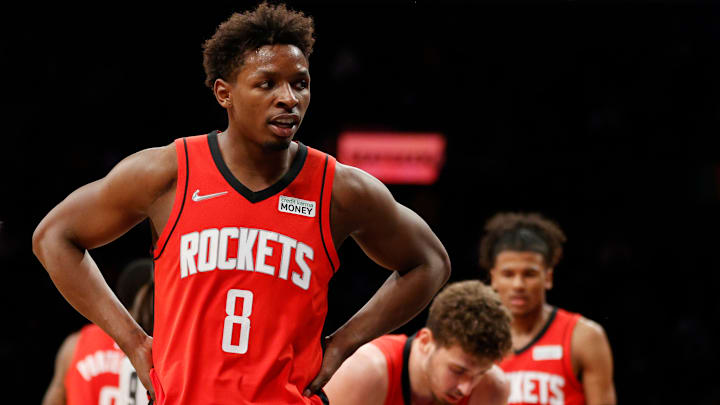The Houston Rockets made a curious decision right as free agency began. They declined Jae’Sean Tate’s $1.7 million team option and allowed him to enter free agency. Tate has been a critical part of the Rockets the past two seasons, and at $1.7 million he was on a fantastic value contract.
The Rockets, however, had no intention of letting Tate getaway. They re-signed him to a three-year, $22.1 million contract on the first day of free agency and ended any and all panic that he was headed for a departure.
New @WindhorstESPN memes dropped pic.twitter.com/Y0YKXd4WtQ
— CJ Fogler AKA Perc70 #BlackLivesMatter (@cjzero) July 1, 2022
The Jae'Sean Tate-Houston Rockets Big Brain Conspiracy Theory
Allow me to Brian Windhorst for a moment. Why would the Rockets decline Jae’Sean Tate’s $1.7 million option, only to re-sign him for nearly $7.3 million? Sure, they added two more years of team control, but they could have done that with an extension. They could have given Tate a two-year, $20.4 million extension and effectively had the exact same deal on their books.
Why let Tate hit restricted free agency and risk losing him or having to match an offersheet? Something is going on in Houston, and it’s not just a franchise rewarding a player.
The NBA collective bargaining agreement is full of quirks. In the battle between employee and employer, it’s lawyers and the little details and confusions they craft that are the real winners. If the Rockets had exercised Tate’s option and then extended him to a similar deal to the one he received, then they would have to wait six months to be able to trade him.
However, by declining his option and technically signing him as a free agent, the Rockets can trade Tate on December 15th. If you’re doing the math, that allows the Rockets to move him about three weeks earlier than if they had extended him. Remember, deals cannot be finalized before the moratorium ends on July 6, which leads to another possibility.
Tate could now be moved in a sign-and-trade. There are no rumblings that this will happen, or if Tate would even be open to it, but what if the Rockets weasel their way into a deal and see if Tate would like to play for a contender for the next three seasons?
The Rockets declining Tate’s option and signing his to a new three-year deal has one more benefit, matching salary.
A common misconception, or misperception, is that the lower a player’s salary the more trade value they have. And to a degree this is true. If Giannis was on a five-year, $25 million deal, he’d be the best value contract in the league, but building a deal to land him would be incredibly difficult.
Because most teams in the NBA are well over the salary cap, the majority of trades have to have matching salary going between teams. Draft picks can grease the wheels, but so do players. Using the hypothetical Giannis situation again, there would basically be no player or collection of players making $5 million that could be viewed as anything but salary filler. This would then force the team to send picks to make the deal work, but what team has enough picks to make that work?
If the Rockets had accepted Jae’sean Tate option, he would be making $1.7 million and be one of the better bargains in the league. The problem is, there aren’t many players making that little that are viewed as valuable, which would mean draft compensation would have to fill the value gap.
The Rockets, by increasing Tate’s salary, have actually made his deal more tradable. There is no such thing as a bad $2 million contract, but there are bad $7 million deals. A contender will be much more open to acquiring Tate and attaching a first round pick if it means they can get off some bad money.
All of this could just be consipatorial nonsense. Maybe the Rockets really wanted to do right by Tate and give him the raise he deserved, and maybe doing that coincidentally made him easier to trade now and in the future. Something was going on in Utah, and maybe, something is going on in Houston.
The Jae'Sean Tate Big Brain Conspiracy Theory pic.twitter.com/srVzEMwqJ1
— N.B. Lindberg (@nblindberg) July 3, 2022
